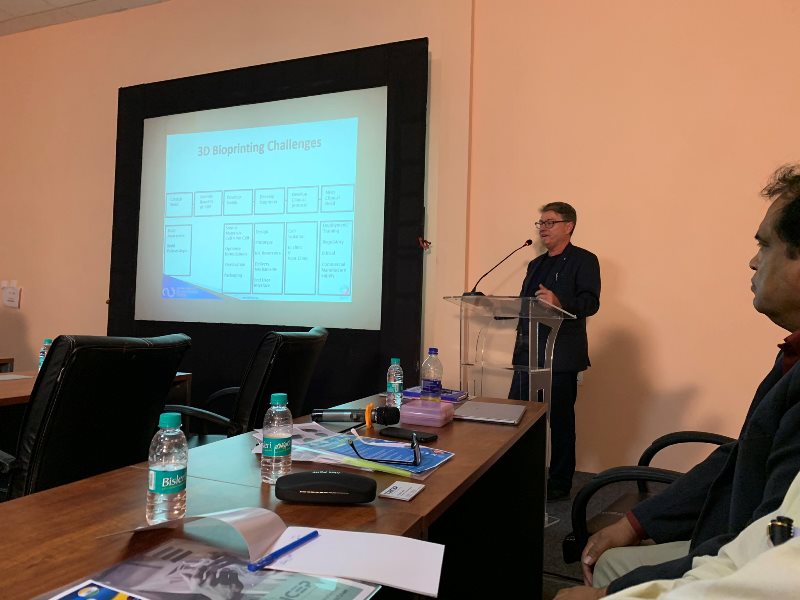News
3D printing bone tissue
Jun 28 2022
Innovation and translation are on the agenda in a new partnership between the ARC Centre of Excellence for Electromaterials Science (ACES), the University of Sydney, and advanced medical technology collaborators in India.

The partnership, which kicks off this week with a workshop in India, will see ACES researchers will work with Ear, Nose and Throat Surgeon A/Prof Payal Mukherjee and Prof Svetha Venkatesh from Deakin University to develop 3D printing, 3D bioprinting and artificial intelligence medical applications between India and Australia.
The team’s first project will focus on producing 3D printed customised, implantable prosthetic ears for Indian patients with microtia, a congenital deformity of the ear. Through collaboration with state-of-the-art Indian MedTech facilities, including the Andhra Pradesh MedTech Zone (AMTZ), the team will seek to establish the necessary infrastructure and equipment and support the accelerated translation of this technology in India. The University of Wollongong’s TRICEP (Translational Research Initiative for Cellular Engineering and Printing) initiative will provide critical input for these collaborative ventures.
This week’s workshop will be held in Vizag, India, which is quickly developing into an innovation hub to adapt new technologies and create new industries. The workshop will explore collaborative opportunities with clinical, engineering and computational researchers, private and public hospitals, and government and non-government organisations, to accelerate research, develop end-user engagement and build local medtech infrastructure to maximise the social impact of Australian health innovations.
Following the workshop, the ACES team at the University of Wollongong will build a customised 3D printer for the prosthetic ear project that can 3D print flexible prosthetic ears that match the colour and anatomy of each patient. The team with invite Indian 3D printing scientists to come to Australia to train on the 3D printer and then travel back in the early part of 2020 to deliver the printer and build further engagement.
A/Prof Payal Mukherjee said it is exciting to take the significant advances made in the Australian 3D printing and bioprinting field and introduce them to the Indian research community.
“It has been demonstrated that 3D bioprinting aid in the treatment of a number of diseases, with a number of these diseases being more common in India than Australia, including microtia,” Payal said.
“Given the heightened incidence of these diseases in India, it is imperative that early bilateral partnerships are formed for faster translation of this technology to India.
“Beyond this, setting up 3D bioprinting collaboration and infrastructure in India will allow for the faster translation of other Australian bioprinting projects into India such as arthritis, blindness, burns and diabetes.”
ACES Director Prof Gordon Wallace said it is essential to develop a collaborative team that brings together a number of diverse skills when using 3D printing to address medical challenges.
“Collaboration and research enables us to identify areas of clinical need, develop the best strategies to meet that need, and to bring together the knowledge and expertise to deliver the most effective solution in the least amount of time,” Gordon said.
“Our exciting collaboration with medtech leaders in India will benefit both our nations – in Australia we need to work on better integrated multidisciplinary services to deliver our innovations to our patients both in the public and the private. In India, we will see the clinical translation of Australian technology to a bigger population, while India has the opportunity to build its local medtech infrastructure and have faster access to medical technology to benefit their growing population.
“Both countries have challenges in delivering health innovations to their rural populations as well. We hope the digital innovations will help in reaching out to those patients who can work remotely with us to access 3D printing innovations.”













